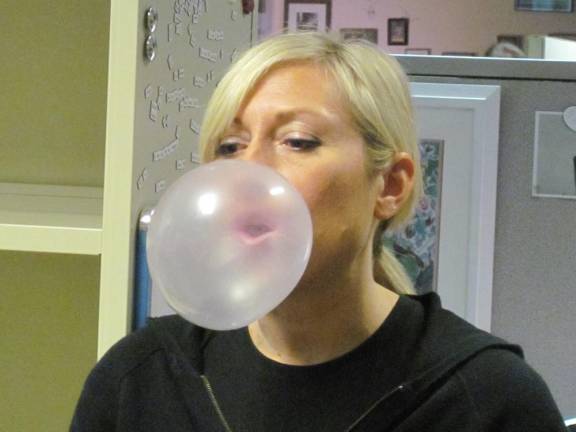Here’s Something to Chew On
While there is not much to boast about regarding the nutritional value contained in a stick of gum and sugared gum can contribute to cavities, there are beneficial results tied to the actual act of chewing. Stress reduction, improved memory and better walking exercises are all attributed to chewing.

It’s hard to pop this bubble. Over 157.23 million Americans are predicted to chomp on $3.5 billion dollars’ worth of bubble gum or chewing gum this year, according to Statista.com.
While the number of users are down slightly from the 160.03 who were using only four years earlier, the stats still show the majority of Americans who indulge will chew a stick of gum an average of two to three times a week and the most active gum-lovers among us average three pieces per day.
Nutritionally speaking, chewing gum’s no bargain. It’s made of four simple ingredients–a gum base (chicle from a south American tree or latex form a lab), a sweetener, a softener (glycerin or vegetable oil), and a flavoring. If the sweetener is sugar, its only significant contributions to your diet are about 10 calories, 3 grams carbs, and a smidgen of fat. Sugarless gum it’s 2-5 calories, up to 2 grams carbs, and he same smidgen of fat.
Despite the dearth of wholesome ingredients, there is some surprising good to be found from the physical act of chewing.
First, chewing gum stimulates the production of saliva which reduces the risk of cavities by helping to wash away acids and food residue left in the mouth after eating and drinking. Better yet, as the American Dental Association (ADA) explains, saliva carries calcium and phosphate ions which help to mineralize the teeth. Tufts psychiatrist Michael DiBlasi told Readers’ Digest that your chewing also appears to boost your mental health, a theory bolstered by a 2015 report from Ireland’s University College Cork and Cardiff University finding that people who chew on a regular basis report less stress and reduced anxiety.
And chewing gum may even improve your memory, according to a study in the Land Down Under at the University of Sydney. Their 2018 study said that students who chewed gum while they studied performed better on exams perhaps because chewing improves “blood and oxygen flow to the brain, keeping us alert, focused, and more receptive to the information we’re learning.” Add to that a boost in fitness. In 2021 a team of Japanese researchers reported in The Journal of Exercise and Fitness that folks who chew while walking generally walk farther and faster and burn more calories than usual. And gum is an effective drug delivery system. Nicotine gums help smokers quit, aspirin gums relieve ache and pains, and baking soda gums such as Arm & Hammer Sugar Free Spearmint Baking Soda Dental Care Gum may reduce the buildup of dental plaque, reducing the risk of periodontal disease.
That’s the good news. The not-so-good starts as you might expect with the fact that sugared gums do indeed raise your risk of cavities a bit. But sugar-free gums sweetened with substitutes such as Sorbitol, Xylitol, or Mannitol, may upset your tummy, the best-known problem being Sorbitol’s laxative effect. Flavorings such as cinnamon may be allergens. And be careful how hard you chew. Gum chewing has been known to dislodge fillings or dentures. And frequent hard chewing might even trigger TMJ (temporomandibular joint disease), headache and jaw or facial pain as the result of grinding the joint that connect your jaw bone to the skull. But the Old Wives Tale about swallowed gum sticking to your stomach is definitely just that although the medical journal Pediatrics did once tell of a toddler who swallowed several sticks of gum a day and ended up constipated due to a mass of gum sitting in the toddler’s digestive track.
Finally, to pick the perfect chew, check the package for a seal of approval from the American Dental Association (ADA), which assures you that the gum has been evaluated by the ADA Council on Scientific Affairs and meets all the requirements for safety and efficacy. That means it won’t harm the tissues in your mouth, and does all the good stuff listed above. And no surprise: Right now, the only chewing gums with the ADA Seal are sugar-free.